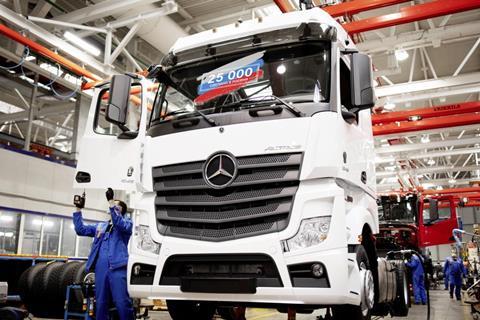ST. PETERSBURG – Russia is asking global automakers to clarify their plans for operating in the country amid increasing pressure from economic sanctions imposed in response to the invasion of Ukraine.
“Russia can’t wait forever,” says Denis Manturov, who as Minister of Industry and Trade is personally responsible for the development of the country’s automotive industry. “Some automakers will leave the Russian market forever. Which companies will leave the country will become clear in late March (or) early April.”
None of the automakers that suspended operations following the Feb. 24 launch of the Ukraine invasion have indicated they will completely withdraw from the Russian market. Some Chinese and South Korean automakers already have confirmed they plan to resume operations in Russia.
But French automaker Renault announced March 23 it was suspending its Moscow-area manufacturing operations and was “assessing its available options” regarding its 69% stake in local automaker AvtoVAZ “while acting responsibly towards its 45,000 employees in Russia.” Renault and AvtoVAZ control 30% of Russia’s light-vehicle market.
Manturov has said most automakers that have shut down have done so because of logistical difficulties.
Dmitry Medvedev, deputy chairman of the Security Council of Russia, said in early March that the Cabinet of Ministers was studying whether to nationalize foreign companies that have halted operations in Russia.
According to analysts, most European automakers and some Japanese companies are at greatest risk of a government takeover.

In addition to Renault, these include the Daimler and KamAZ truck- and bus-manufacturing joint venture (pictured, above), the Mercedes-Benz plant near Solnechnogorsk, the Volkswagen plant in Kaluga (along with VW assembly operations under contract with local automaker GAZ), the BMW project at Avtotor and local automaker Sollers’ JV with Ford in Yelabuga.
Also at risk of nationalization are Toyota assembly operations in St. Petersburg and the Mazda-Sollers JV in Vladivostok in Russia’s Far East, the Gazeta.ru business paper reports.
Many local industry experts, however, consider nationalization a dead end that will cost the government the trust of foreign investors. They cite the USSR’s nationalization of foreign assets, which deprived the country of advanced automotive technologies for decades.
Complicating the situation is that most of the equipment and machinery in foreign automakers’ plants are designed to work with specific auto components and equipment which would not be available if economic sanctions against Russia continue.
According to some independent analysts’ assessments, automakers’ losses from suspending Russian operations will reach €13 billion ($14.3 billion) this year.
In the meantime, amid ever-toughening sanctions, the Russian government plans to develop a package of new measures to support the domestic auto industry, with details to be announced later this year.





